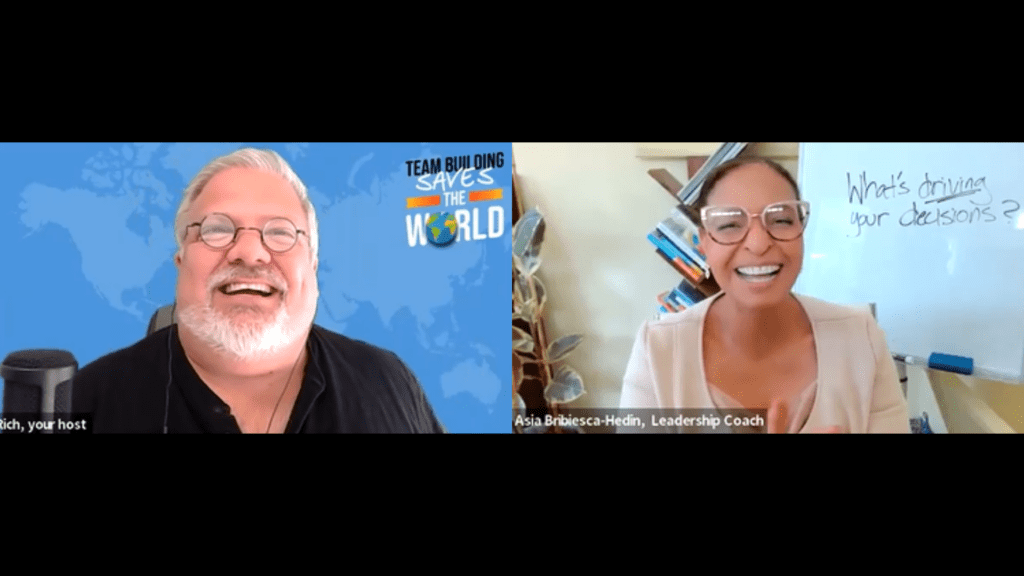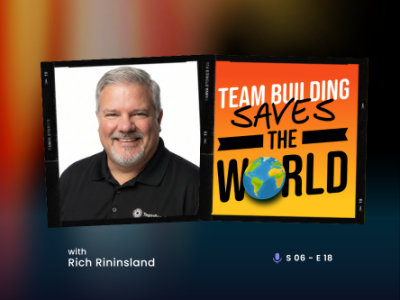Building Confidence at Work
w/Asia Bribiesca-Hedin
Use the buttons above to listen now.
Transcript - Building Confidence at Work
Rich: On this episode of Team Building Saves the World.
Asia: You know, I, I read all the books. I, I practiced all the mantras, I did the stance, and I still don’t feel confident. I must be really screwed up, right? Then we go to that place and the problem is we’ve been doing it all wrong. If you wanna really drop your self-confidence quickly, go to pretending and pretend you’re not pretending.
Rich: to just like take time and be stupid. Yeah. , you have to learn. That’s cool to not be afraid of looking stupid. Understand that sometimes looking stupid is exactly what is needed. Yes. And.
Hello team. It’s me. Your old friend, Rich Rininsland host of team building saves the world, the show where I speak to the leaders and innovators in employee wellness and corporate culture on how it reflects in the world of today. And today, we’re building confidence with leadership coach and old friend of the show.
Asia Bribiesca-Hedin but first, I need to share some love with the rest of my supporters at Team Bonding. If your team is ready to experience teamwork through the power of play, then visit teambonding. Com to learn more. Now, team, join me in welcoming back to the show, my guest for today, founder and CEO of bridgewell, llc, Professional Services, Asia Bribiesca-Hedin
Asia welcome back.
Asia: Thank you. It’s so good to be back. It’s so good to be back rich.
Rich: I even gathered those same people to tie up under my desk to applaud you.
Asia: Oh, I love it. I love you. Send them my regards.
Rich: Will do. All right, so we are talking confidence now. That seems like such a vague, innocuous thing to start.
How would you define confidence, and especially in the workplace? Why is it so important?
Asia: Yeah, I love talking about confidence. I mean, you, you know this, but there are a couple of ways that I like to talk about confidence. Okay? Right. Cause usually confidence, a lot of folks, and I say, Well, how confident are you?
They might like to answer with, uh, something like, Well, it depends , right? So what they’re trying to tell me is that their, their confidence or meaning how certain they are, that they can show up in a certain way. , you know, kind of engage fully. Things like that are really dependent on, um, something else.
And so, it’s funny, I was just having a conversation with someone and then this’ll get to my, my definitions of confidence, cuz I wanna make a couple distinctions here if that’s okay.
Rich: Sure, Sure. Yeah.
Asia: Just, just talking to someone on a consult and this happens so much. Uh, I was having a consultation with a new client and I asked him to rate his confidence on a scale of one to 10, 10 being best.
He said, oh nine, 9.5. And I said, Oh, okay. That’s great. And we talked a little bit about what had him say that. And I said, Well, I, I gave him a situation. What about when you’re in a room with people that fit X description or who know a lot more about the subject matter than you do, or your, or the subject matter is completely foreign to you.
He said, Oh, no, no. Well, in that case, I would, I would rate it about a four. And I thought, Okay, let’s get into it. Let’s get into it. , because he, it’s such a common experience that’s so funny that, that people respond that way. And so I like to break it down into thinking about it in two different ways.
One is What I refer to as the confidence that comes from your past. Kinda like I know the subject matter, I know these people, I know what to expect. I’ve done it before. I can do it again. Like, you know, I have some evidence of success. I can do this again. We’re good. I refer to that as circumstantial confidence cuz it’s circumstantially motivated, right?
So if kind of all the factors are in place, you feel confident. And when you feel confident, that means that you don’t have that voice hijacking your, your thoughts and your brilliance and how you engage and how you show up so you’re not all weird and, and awkward and all that stuff, Right? That’s not going on in the back of your head because, you know, there aren’t all those additional doubts popping up.
Right? So confidence really is just your, your belief and your ability to be successful at whatever it is, right? Filling in that blank.
Rich: Sure.
Asia: But it’s often circumstantial. I like to distinguish circumstantial confidence from what I call real self-confidence. And real self-confidence is independent of who’s in the room.
It’s independent of, uh, your expertise on the subject matter or whether that’s your domain. It’s independent of whether people are being nice to you. Or whether they’re raising eyebrow or whether they’re kind of cynical, like it’s not dependent on someone else, like your ability to show up and basically decide you have your own back and can figure it out, right?
No matter what it is that shows up is really not dependent on other people or whether they’re being nice or whether you know the subject. Or whether, you know, they are trying to trip you up or whatever it is that’s going on. So, I know that was a really long answer, but I wanted to dis distinguish those cuz I felt we get totally tripped up in ourselves.
Right?
Rich: Absolutely. Yeah.
Asia: When certain people are in the room Right. Or when certain topics are being discussed. Right. Or when somethings on the line. Yeah, go ahead.
Rich: But what is the difference, um, when it comes to the workplace? Like how, why is this so important in the work?
Asia: Oh, thi this is like, this is it, Like this is critical because when you think about it in a workplace, your, your brilliance, your ability to contribute, your ability to connect, your ability to, to think strategically and logically and just really bring all of your expertise with you needs to be accessible to you.
Not just when everything is going according to plan and when you kind of know what to expect and when people are playing fair and being nice, but I actually argue that is even more important when things are not going according to plan when people are not playing nice. Mm-hmm. , right? And people are trying to trip you up.
That’s when it really matters that you’re able to show up and bring all that brilliance, bring all that expertise, bring that background, that perspective, and, and engage completely as opposed to getting tripped up, tripped up in our heads with, Oh, should I say something? What’s so and so gonna say? What does that raised eyebrow mean?
What ,
Rich: So would you say this is the definition of real self-confidence versus the circumstantial? .
Asia: Yes. Yes. Being able to show up completely, being able to contribute, being able to support, being able to ask the questions. Even if you’re afraid, you look stupid. Right. And here, here’s the thing, so much of what my clients say is in their way
is their perception of what other people are gonna think about something. Right. And I’m like, I’m like, Wow, perception is so tricky. Right. Because there’s my, you know how I perceive things, there’s how I think you perceived things. And then there’s how you actually perceive things, right? And so, but a lot of the decisions we’re making on are on that second one, right?
How, how I think you perceive things, which of course, I don’t know. Last time I checked I really, I could not read mines and I’m not very good at it. Like I, I haven’t figured out that part. So yeah, if we can set that aside, we can stay in the moment, right? Like that self confidence allows us to stay in the question of what’s most important here?
What are we trying to accomplish here? It’s a difference between walking into a room and asking yourself, I wonder what they’re gonna think if I say this. or I don’t wanna look stupid and having that be the driving thought or you know, you can see on the board behind me what’s driving your decisions.
Right? Right. And having that be what’s informing what you ask or how you show up or how you speak up, what you, what you say versus same room, same meeting, right? Same. Either expertise or lack of expertise, but you’re walking and thinking. I wonder what are some of the most important concepts here? I wonder what might get us to the finish line faster.
I wonder why this didn’t work last time, or I wonder how we, how else we could look at this, or what questions I can ask to, to clarify and bring, you know, the dots together. Right? Right. Any of those questions, think about it. Rich. Any of those questions are gonna have our brains showing up in a different way than thinking, I don’t wanna look stupid.
Rich: Well, let’s back up just a quick second and think about right off the bat, just for any listeners out there, anybody on my team, how will they know if they have true self confidence or if they need more?
Asia: Oh, Yeah, I love that. So I encourage people to distinguish whether they have true self-confidence , by finding out whether they’ll be hijacked if something doesn’t go according to plan.
Rich: Ah, . Okay. Yeah.
Asia: Okay. So if you are going to be totally thrown off your game because somebody doesn’t agree with you, or somebody asks a kind of critical question, then there’s a good chance you’re defaulting to that
you know, circumstantial self confidence. Right, Right. Where everything has to be going on a accordion plan, everybody’s playing nice. You know what to expect. Everything makes you look good. It’s, it’s all good. Right? So I, I feel confident. And then take that to the other side where when you have true self-confidence mm-hmm.
of course, you’re a human being, so you’re still gonna get, you might get a little frazzled, you might get embarrassed, you’re like, Oh, I said the wrong word, or the PowerPoint didn’t work, or whatever the case is. But then you get back to, Okay, so what’s most important here? Okay, that’s right. These were the three things I wanted to make sure we talk about.
PowerPoint’s not working, Let’s get through this. Okay, you guys, here’s what there is to do. Right? Great. It gets us back into our game. We can get back into our game. But really the, the biggest what? I get it the same, the best tool you can use there, in my opinion, is putting purpose over praise. Gotcha. Yeah.
What I mean when I say that is, you know, again, I keep going back to like what’s most important here, but you know what there is to accomplish in that room. So you walk in with a purpose in mind, an intention in mind, an outcome, Right? A shared outcome that, you know, we’re trying to get to. And that is going to carry us a lot farther than walking, walking in, trying to get it right.
Right. Because as soon as we walk in trying to get it right and something doesn’t go according to plan, we’re left complet. Off our game, we’re completely derailed and it’s hard to recover. Okay,
Rich: so are we trying to say that it’s a measurable experience or expertise? Because what? Because it sounds like to me what you’re saying is you can tell you have self confidence if you have good crisis management.
Asia: That’s a way to, That’s a way to put it. I don’t actually necessarily think about it that way, but I think that’s really a good way to put it. Okay. Might be good crisis management, but I would actually even bring it back and say, Good uncertainty management. Right. Because confidence is often tied to our level of certainty in whatever it is that’s going on, whatever we’re gonna do, whatever we think is gonna happen.
Hmm. So I, I think what needs to happen is we need to be able to divorce our sense of confidence and how we’re, how we’re able and, and willing to show up from. Certainty, you can be completely confused and still confident. Right. You know,
Rich: So the question I guess, that everybody should be asking by this point is, is this a learnable skill or is it just something we’re born with or that happened when we were young?
And it’s just, that’s how it is now. You have to learn how to deal with what you’ve got.
Asia: Gosh, I believe wholeheartedly that it’s a learnable skill.
Rich: Oh, good. Or else you’d be out of a job, I’m sure. .
Asia: Yeah. Yeah. I’d be, I’d be out of a job . Right. I, I think back, and in all seriousness, I was really good as I look at myself, you know, 20 something years ago when I was in business school, and here’s the thing, on the outside, it might have looked like I was really confident.
Yeah. In fact, I was Class president of my, my, you know, the usc, uh, business school, you know, student program, and I, I got one of those coveted management consulting internships. Probably had the highest starting salary in my class. Nice. Now, all of this rich, just to give you perspective, when I was the only black woman in my entire class, Of 200 people.
This is in Los Angeles, right? This is at USC in Los Angeles, yeah. Yeah. But that was just the, what was happening at the time. Okay. So to say that there was a chip on my shoulder that I was always questioning myself is an understatement .
Rich: Sure. Right.
Asia: So, So I would do what a lot of us do today that what a lot of us oftentimes have been trained to do, which I think is kind of, is backwards, but.
I went ahead and started chasing credentials and chasing kudos and chasing validation. Right? So what Essentially what we on default to is trying to fill our self-esteem gaps or voids with somebody else’s temporary approval. Right. So if something’s not going to accordion plan, if we’re not feeling very confident, we’re not feeling capable, or whatever the case is, and we’re thinking, I’m not enough, You know, you go out and you get another credential, you get another certificate, you publish another article, you whatever the case is, right?
Mm-hmm. , in essence, trying to chase those gold stickers, that doesn’t work because it’s temporary. Like that is not something that works, right? And yet, here’s the. People will actually go out and do that, and then they’ll practice all those confidence tricks and tactics. Like, well do the superhero pose before a meeting.
You know, repeat your mantra to yourself. And, you know, I don’t, I don’t wanna bash those too badly. But the challenge is that when we go to that place telling ourselves affirmations, we don’t believe mm-hmm. , our brains know we don’t believe it.
Rich: Right. And all, all you’re doing is reinforcing self doubt in that.
Asia: Yes, Yes. Yeah. And then we get to that point where, hey, well, I already did all the things. You know, I, I read all the books. I, I practiced solo mantras, I did the stance, and I still don’t feel confident. I must be really screwed up. , Right? Then we go to that place and the problem is we’ve been doing it all wrong.
Okay? Really, that, that ability to grow our confidence. I always say it’s, it starts in this, It always starts from the inside in terms of your values, but in terms of the things that we need to do, we need to get clear on what’s most important and it can’t be us. So that’s number one. Sure. Right. When you’re, we’re walking into a room, what’s most important?
Can’t be us. There needs to be a purpose outside of us because let me tell you, even the most confident person in the world, if they walk into a room thinking I really need them to like me, they’re not gonna show up the same way.
Rich: Well, I want you to show back up for me just one quick second cuz I do need to step aside.
I need to tell all my team out there about a company. I am so proud to be a part of Team Bonding team Bonding was founded over 20 years ago with one simple question. How can employees have a great time while fostering strong authentic bonds between people who work together? They’ve created a catalog of innovative events using the power of play as a learning tool, and tapping into the correlation of work and play.
From scavenger hunts to jeopardy and so much more, the team bonding of activities, whether they’re live virtual or hybrid, maximizes the impact of team building with an accent on fun. So visit team bonding.com to schedule your event now. Team bonding when you want. Seriously. Fun results. And we’re back talking about confidence with oes Hadeen.
So how do we build confidence? I mean, we’ve talked briefly on what not to do. If it’s not working for you, then don’t keep doing it. So what? What could work? What’s a simpler way for someone who wants to get that foot in the door of their own self confidence.
Asia: Figure out what’s most important. What’s most important here?
That, that is literally one of my favorite questions in the world. What’s most important here? Cuz it keeps bringing us back to why we’re doing what we’re doing. Okay. You know, the challenge is the answer can’t be looking good or being impressive. Right. So it, it’s funny, I, I just had a conversation, this is now a few months ago, uh, with a client when we first started working together and he said, You know, I have a problem connecting with people.
I don’t know what is that’s going on. And so I’m having a conversation with him and I’m like, You have, there’s no communication issue, right? We engage really well. So tell me a little bit what it is. What is it that you’re thinking or what, what is it that you, you want them to think or feel when you’re meeting new people?
He’s like, Well, I want them to be impressed. I’m like, Oh, so see, connection is about the other person, right? Being impressive is about you, . So, you know, I, I bring that up just to reinforce, cause I know it sounds so simple when I say it, but what’s most important here, you can’t pretend that you’re trying to connect when in reality what we’re trying to do is impress, right?
That is a sure way to mess up, have our confidence, you know, throw it for, for a loop. Because it’s, it’s caught up in this weird, convincing energy Instead of staying in your head, leveraging your brilliance and figuring out what’s most important here. Now, okay, that didn’t work. All right, now what do we need to do?
Rich: Is there a certain level of the other side of the equation that other person is able to pick up That lack of confidence that that not, not desperation to come across as impress. But the intention is not based on what the conversation is. You’re trying to instead get me to feel something for you.
Asia: Yeah.
Well, I don’t know. You tell me , right? So if you, you’ve ever been in a situation, and I think we probably all experienced this, at one point or another, you’re talking to somebody and you’re like, Okay, they, they’re saying all the right things. They’re doing all the right things, but something just doesn’t feel right.
You know what it is that just doesn’t feel right is that they’re pretending to do or be one way, but their, their actual intention is something else. Right? Right. When your intentions don’t line up with your actions, that’s a sure way to keep you out of confidence. Hmm. Right, Because it’s pretending by definition you’re pretending.
And if you wanna really drop your self-confidence quickly, go to pretending and pretend you’re not pretending.
Rich: Well, now you’re talking to an actor. Now I understand what you mean.
Asia: Okay, good. Your brain goes for a loop, right? Like, you know, when you’re pretending. So it’s all good. Yeah. Yeah. You pretend you’re not pretending right? And you throw yourself into this other mess and people are like, What is he doing out there?
Um, but yeah, definitely. I mean, we even have. For it, right? That used car salesperson vibe.
Rich: But how do we get, what can we do or what can we help them to do to get even get started? I mean, how does one even recognize that? They’re not using the correct intention,
Asia: it’s by figuring out what’s driving your decisions.
I know that sounds funny cause that’s the board behind me.
Rich: Yeah, yeah.
Asia: But it’s really about figuring out what’s driving your decisions.
Rich: Okay.
Asia: Is what’s driving your decision and that action you’re taking or the way that you’re engaging that. Again, in the case I just gaved you that you’re trying to connect with someone or is what’s driving your decision that you wanna look good in their eyes.
Right. Right. So it’s driving your decision. That you’re trying to contribute your knowledge to this meeting cuz you think it might make a difference or is what’s driving your decision, that you wanna hear yourself talking so other people can know how smart you are.
Rich: Then let’s look at a little bit more of an extreme situation.
Instead of talking about the person who’s gonna be standing up, giving that speech, giving that, that topic of discussion, who, if the discussion itself, the topic itself is not your intention. Your intention is to look good in front of the boss, look good in front of coworkers, whatever it might be, what about that person who’s sitting down that person who’s just a little too hesitant to raise their.
What is, what, what can they start doing for themselves to change their perspective?
Asia: Okay, so that’s such a good question cuz that is the more common every day, Right? Right. Hesitating to take action. Right. But again, we’re, and I know we, we mentioned this just a moment ago, but hesitating to take action is coming from that place sub, what are they gonna think?
Mm. Or more importantly, It’s coming from a place of what am I gonna think about myself if I raise my hand and look stupid? Yeah. It’s not even what they’re gonna think, but what it is is that you are afraid that if you raise your hand, do the wrong thing, look stupid, that you’re gonna make it a death sentence for your self-esteem.
Right. So you’re getting really significant about yourself in that moment, and I know in that moment you’re not thinking about it that way, In that moment you’re thinking, Oh, and the funny thing is we get really good at talking ourselves out of it using logic. Yeah. Like it’s not that important. Everybody already knows that.
You know what, I’m not gonna say anything. Right? So one of the things I, I encourage people to do, is to actually ask the question from that perspective, if you think everybody already knows, is saying, Hey, we might have already covered this, but how are we gonna address A, B, and C? Right? Or, you know, this might already be resolved, but what was the decision on, on blah, blah, blah.
Because let me tell you, nine out of 10 times, there’s at least one other person in the room who’s asking the exact same question. Mm. So pose the question. There is no harm imposing the question, especially when you’re approaching it from that place of curiosity and wanting to understand and contribute, right?
So even if you’re wrong, mm-hmm. , you know, go ahead and pose the question, open the door to that conversation because there’s a good chance you’re opening the door to that better solution, that better outcome. So how can you ask the question?
Rich: Would you say that it is better? to ask the question and risk the not looking stupid, because I don’t think anybody actually looks at anybody else and goes, What a stupid question that was.
Is it better to ask or is it better to just sit and be quiet?
Asia: I think it’s better to ask, right? Yeah. Yeah. I think it’s better to ask. Yeah. I think it’s always better to ask. Now, granted, you know, let’s be clear if you’re asking, because you didn’t read the pre-read for the meeting, you know, Don’t be numb
skull, do the pre-read , right? Because you don’t wanna set yourself up that way either, right? So handle your business, but you show up. You’re an intelligent working human being. You know, they, they, they hired you for a reason, for your contribution and ability to support those outcomes. So ask the question, bring up the topic.
Just say, Hey, I just wanna make sure I’m clear. , right? How are we approaching this? Or I’ve seen some road bumps in this area in my past life. How are we addressing them here? Or, I understand there was a recent change that might impact this. This is why what I heard, Did you guys hear the same thing? Right?
There’s so many ways of, of posing it that the answer might this just be, Oh yeah, we already incorporated. Or, you know what? No, let’s look into that a little bit more, and that’s all right. Mm-hmm. , right? You’re not there to save the date, but you’re definitely not there to hide and cower, right? And keep your brilliance to yourself, right?
That’s not, not what they brought you in for. Yeah. That’s not what you are in it for.
Rich: It’s better to be remembered for asking a, a driving question than it is to not be remembered at. .
Asia: That’s a good way to put it. Yeah, Yeah, yeah. That’s a good way to put it. And the thing is, here’s the thing, Rich, when we make decisions out of fear, We always think it’s gonna have us feel more safe.
So for example, you’re in the meeting, you’re sitting on your hands, you’re biting your lip, you’re not saying anything. Yep. And then you walked out and you’re like, Okay, yeah, I, I didn’t say anything, so that’s fine. I didn’t look stupid. But now at the next meeting, you’re even less likely to say anything.
Mm-hmm. . Cause all of a sudden that decision you made out of fear to not contribute even though you knew you had something to add. Right. Is just going to be reinforced. And now you’re almost more finely tuned into anything that could possibly go wrong. Any, any criticism that might come up or the possibility that it might sound silly or be unnecessary, you’re even more finely time tied into that.
So next time you’re even less likely to contribute, you’re even less likely to to point out a clarification that could actually make the difference. So go ahead and ask, and if you’re really concerned, come up with a couple of questions in. Even saying, Hey, I just wanna make sure I go back to what are we thinking is most important here for this outcome?
Okay. We talked about three priorities. If we had to choose one, what might be the one that makes the biggest difference? Right, So walk in having considered a couple of clarifying questions that, you know, can support other people as well. You know, you don’t have to leave it to yourself to come up with something on the spot necessarily if you’re just learning to get engaged and share at that level.
But come up with a couple of of good questions. You would ask now, what makes this more important than this? Just so that I’m clear
Rich: for those people who are trying to build that up within themselves, I’m certain one of the bigger fears that they have is that they’re going to look overconfident, that they’re going to look almost braggadocious.
How can you recognize when you’re going in that direction and how can you assure yourself you’re not?
Asia: Yeah, I, you know, and maybe I oversimplify this, but I. If you are making it about yourself, there’s a good chance you’re gonna come off, as you know, as a bragger or as you know, arrogant or whatever the case is, when you’re making it about the outcome or about them, there’s almost nothing you can say that’s gonna come off as arrogant, right?
Rich: I, I’ve known so many people throughout the years, and maybe it’s just my career choice that, the career path that I’ve taken, but I’ve met so many people for. , they are very knowledgeable about whatever aspects we might be talking, but they still manage to make it sound like it’s about them. How do we make sure we don’t become those people?
Because they’re, It is always amazing to me how much they don’t realize. It’s so obvious that they’re trying to shine the spotlight on themselves while even talking about a topic. They might not be fully invest.
Asia: Yeah. Yeah. That is a, that is another side of Yeah, low confidence, right? Like bravado. Right, right, right.
It’s that, that kind of thing. So either you’re going to like hiding and trying to get outta the cross hairs or to the bravado and let me be the biggest, scariest thing in the room. Mm. Yeah. Both of those are coming from that place of fear. But the pro bravado just has a lot more ego wrapped up into it.
Okay. I don’t know. When we find ourselves reactivated, and here’s the thing, and when you’re making those decisions out of ego, you’re gonna notice you’re quickly reactivated. And what I mean by that is that as soon as somebody asks a, a question that might be potentially critical, or questions, anything you say,
you’re all in a fluster and you’re. Right. That’s how you know you’ve made it about you. I remember doing this like literally all the time. I would not only be tremendously embarrassed if anybody asked me a question, but then I would take it personally, Right. As though the question they asked about my project was somehow an indictment on me.
isn’t that weird? Cause that it had nothing to do with each other. Yeah. But that’s how it was landing. Yeah, and that’s, that was kind of my trigger that. Something is weird here cuz it wasn’t about that. I actually want people to ask questions. Mm. So what’s going on inside of me? That’s having me feel like I need to deflect and defend and have the last word.
Right. If you’re in that place, if you feel like you always need to have the last word, always need to look the best or look good. Yeah. We gotta catch ourselves. We gotta get better at noticing when we’re doing those things then. And um, God, I know we only have so much amount of time, but I, Yeah, I always go to that.
We’re not taught to think about our think. We need to think about our thinking. The quality of our thinking matters, but we’re not taught to think about the quality of our thinking. We think that cuz it showed up in our brains, that must be true. That is not correct. And we see this right all the time when people are doing things and you’re thinking, Whoa, we’re thing
Right? I, I liken it to like drinking and dialing if anybody knows it. Drinking and dialing is when you’ve had, you may be one too many. And at that point it sounds like the perfect time to call, like your boss, your ex, your, your former friend, to tell ’em exactly what you think about them and you feel certain, like it makes perfect sense.
Yeah. I, I needed to be this brave all. And then the next day, Right, you look back Yeah. And you’re like, What was I thinking? But that’s because we can’t tell when the quality of our thinking is compromised. So what I, I encourage people to do is, you know, we can’t tell when the quality of our thinking is compromised, but we always seem to know how we feel.
We’re so funny that way. Mm. Like we know when we’re kind of defensive and reactivated and all of a sudden our faces are all hot and flushed and, and you know, we’re, we’re tightening. We do seem to notice that. Yeah. So when we feel that happening, there’s a good chance the quality of our thinking is compromised.
Rich: Okay, so hold up. Let’s go from the other direction here. I’m management in a company and I know that I have good people who have great ideas. I see it in them, but I also see them struggling to bring it out. How can I help them? And even let’s, even, let’s be more personal to me because I have so many events now, especially going back to live.
Where I have the client contact saying, Help me bring these people outta their shell. Yeah. How do we do it? Yeah. What’s the key?
Asia: Gosh, you gotta, you gotta find out what’s actually important to them. Mm. What’s actually important to them, What’s going on in there. Because especially if you can see their brilliance, right.
You can see their brilliance and. So what is that? What sparked that? How did they get interested in this to begin with? But when people are particularly afraid and, and kind of in that, that hiding mode, cuz they’re making decisions out of fear. I always say, you gotta, you gotta make it not about them. You gotta make their ability to engage, not about them, right?
But entirely about the project entirely. Yeah. You know, what are, what are some things we might be not be seeing now or whatever the case might be? The conversation is that there is to be had, but it can’t be about them. And that’s a challenge when you’re trying to interview somebody and it’s about them.
Right. Right. But when you make it about the thing they’re passionate about, the thing they, they work on, they, the place where they have expertise, you can start, I think it kind of opens the door to teasing that out of them because there’s, there’s, it’s gonna be difficult to get people. They, they, We can’t just magically turn that on.
Right, right, right. And be able to completely show up confidently when we didn’t feel that to begin with. Yeah. It’s something that’s practiced and developed. That said, when it’s not about us, we’re probably much more able to contribute and to have a meaningful conversation.
Rich: It always seems to come down to success.
When you have someone who tries something and it succeeds for them, they get a little more self-confidence and onward and onward and onward. Is there ways a manager to help them along that route?
Asia: Absolutely. Absolutely. And I think, you know, be willing to catch them winning and be willing to catch them almost winning.
Right, right. Cuz there’s a real power in saying God. That was almost perfect. Look, let’s sit down cuz there are a couple places I think this can improve, right. That was like, who doesn’t wanna hear that? That that was amazing. And I think it’s gonna go over the top if we’re able to tweak this, but be willing to catch people almost winning.
The problem is we are more prone to catch people slightly missing Yeah. Than almost winning. Right? So as a boss, be willing to catch people almost winning.
Rich: Is there a way to identify an almost miss as an almost. Can we just reorder the wording a bit to make it sound like that was an excellent chance you took or an excellent choice?
How about we try it this way though?
Asia: Yeah, I, I think that’s absolutely right. Okay. I think that’s absolutely right. It’s just your, It was so close. Or, you know, that was pretty good, but it would be even more effective if we did this.
Rich: I’ve never had to do this as management back when I was doing management for, for security work in, in a corporate environment.
But as a performer, as a director, as a lead actor, what have you, I have always said to everybody, Just like take time and be stupid. Yeah. You have to learn. That’s to not be afraid of looking stupid. Understand that sometimes looking stupid is exactly what is needed. Yes. And then you get to, if you can flourish while feeling stupid, it is the fastest way to get out of your own head.
Asia: Yes. I love that so much. And I agree. I agree. And the thing is, at some point you actually stop feeling stupid, cuz again, stupid. That experience feeling stupid is just how you’re perceiving, other people are perceiving you.
Rich: Correct. Right, right, right.
Asia: Yep. And so the, and the longer we stay in that space, the more we, we feel that experience.
But at some point you stop worrying about how other people are perceiving you and start thinking about what you’re there to deliver, what you’re trying to contribute.
Rich: Is there a corporate level? Because I have literally had people walk around like Ibis. I have had people walk around with the silliest, most nonsensical stuff either coming outta their mouths or out of their bodies, just as a way to get people to open up and relax.
What kind of corporate measures can we take along those ways?
Asia: Oh my gosh. To get people to open up and relax, I. Well, you gotta make it safe. So I mean, in all, in all fairness, right? When we’re talking about the corporate environment, what is happening that has people default to believing that they’re not safe?
Default to believing that they need to withhold what’s having them default to believing that they can’t show you who they are or that they’re not allowed to make a mistake. Right? So this sometimes it’s something that, you know, we created in our brains. We’re bringing some past kind of workplace trauma with us, right?
So in all fairness, sometimes that’s what it is, but sometimes there’s actually, oftentimes there really is something in the environment. So what’s happening? You guys need to play more together. . You guys need to eat more together. Right? Okay. What is happening That people are feeling like they need to hide, like they need to, you know, withhold their ideas for fear of looking stupid.
Mm. Or feeling stupid or being told. You know, somehow, uh, Ill prepared or whatever the case is. So what is happening in the environment? Cause I mean, you gotta think about this. If you’re not willing to allow people to look stupid, you’re also not willing to allow people to do the incredible, right? Cause you’re not allowing them to innovate.
You’re on not allowing them to take chances and go out there and do amazing things. So what is happening in this environment that’s not allowing people to take chances?
Rich: Let’s now look at. Modern workplace because I have had so many clients who are still in a hybrid model, and that seems to be the way everybody is staying, but it’s so much easier when half of your meetings, or three quarters of your meetings even are on Zoom or some other, you know, posted site where you’re just another one inch little box, one inch square box sitting on a screen.
What kind of clues can we give people right now to say you can act and look more confident? Just by doing this online.
Asia: Ooh. Okay. I gotta be honest, I’m not big on trying to act and look confident, cuz I think that that’s actually, that’s actually the source of the imposter syndrome epidemic. Gotcha. In my mind.
Okay. Right. Good. I’m not big on acting and looking confident. Okay. But I am big on is understanding what’s most important here and why am I here so, What is that, that’s actually most important there? And what does that encourage you to do in the meeting? How does that encourage you to show up in the meeting?
In order to be able to kind of live into that? But really I would almost. If you’re really wrapped up in your head, maybe you can even turn it into a game. I know we were just talking about play and you guys like a masters of play. Yep. Yep. But even turning it into a game, like, um, when I was in, uh, consulting and, and project management, one of the, I always used to say that there was this one tool that if you took away all of my other tools, I could be successful with this one tool.
Okay. And what the, the, the tool was, it was like a stakeholder. Agenda, so to speak, tool, right? So it was a stakeholder log and all that did was that tool. We used it in order to understand not only who the different players were, but where, what some of their agendas and perspectives were. Hmm. So you could almost turn it into a game and sit in that meeting in your one inch box and listen and watch for everybody else’s.
Turn it into a game and just see what you learn as a result of doing that. But what you do is again, you get yourself kind of out of your head of thinking about yourself and really trying to understand what other people are and are not trying to accomplish where you have conflicting agendas that might have not been brought to the surface yet.
Mm-hmm. . Show up and engage, and that’s just, you know, one of those silly games you can play to engage that has nothing to do yet with raising your hand. It makes you that much smarter, right? Yep. Because when you understand what other people are up to, what they’re really trying to make happen, you can contribute and collaborate at a higher level.
Rich: Fantastic Asia. I hate that this show is so short. I know we’re even going long. My producer has been screaming on my chat that we’re running long and yet, Okay. We could just, I could follow you down this rabbit hole all day. But instead we started talking about games. So get ready cuz once again it’s time for you to face Must speed.
Round speed. Speed.
You know how this works from before Asia. 60 seconds. I’m gonna put on a nice little piece of music that runs for 60 seconds and then in that time you’re gonna try to answer as many innocuous questions as you. First thing comes off the top of your head, okay? Again, Okay. Don’t be afraid to sound stupid.
That’s the only, that’s the only thing I can say. It’s. All right, my friend, if you are ready, let’s begin. What’s your name?
Asia: Asia.
Rich: Do you have any nicknames?
Asia: Uh, Gotti.
Rich: If you could pick a nickname for yourself, what would you like it to be?
Asia: Uh, Assie Bear.
Rich: Who’s the funniest person, you know?
Asia: Oh my gosh. Uh, that I know
Rich: first. off the top of your head
Asia: Pass
Rich: okay. What’s your favorite thing about your grandparents?
Asia: All the stories I hear from my other relatives.
Rich: How are we feeling about this interview?
Asia: Fantastic. ,
Rich: what’s your favorite smell in the world?
Asia: Coffee.
Rich: Give me one word to describe your family.
Asia: Aw, loving
Rich: What’s your favorite time of day?
What’s your favorite season?
Asia: Fall.
Rich: I’ll give it to you because it came out. You’re still a 10 though. It’s still a 10. You tied yourself. Congratulations,
Asia again. Thank you so much. Can I call you Assie Bear? Is that okay? ?
Asia: Sure you can try. That used to be my nickname in high school. Still . .
Rich: Asia thank you so much for coming out. Team. Once again, give a big round of applause to Asia
and as always, Asia is there any place that anyone can find you if like they, for example, need some help with leadership or getting themselves into a better position as leaders?
Asia: Yes, definitely reach out to me. Schedule time to connect. You can go to leadership division.com. That’s probably the easiest place online to find me.
Leadership division.com. And you can connect there. But where I’m active all day, every day, LinkedIn, go ahead and connect with me there and you know, sit down on one of my next free programs. In fact, I have a free leadership bootcamp coming up in December. Awesome. Like five day strategic leadership bootcamp.
You can sign up for that on LinkedIn as well, so check that out.
Rich: Fantastic. Thank you Asia, and for you all my friends. There we go. That’s yet another episode of Team Building Saves the World. If you’ve enjoyed this episode, whether you’re new to the podcast or an old fan of the show, please be sure to share with everyone that you know.
Whether they’re a coworker, a friend, a family member, just helps us to share all of this vital information You can find out all about us, including our past episodes@teambonding.com slash podcast. You can. It’s wherever you find your favorite podcast. Google Podcast, Apple Podcast, Spotify. Wherever you go to listen, we will be there.
And if we’re not there, I want you to go on the social medias, find us a Team Bond podcast, Tell us where we’re not, because I wanna be there. I wanna be where you are listening and you know why you’re on those social medias. Why don’t you go ahead, leave us comment, Tell us what you like about this show.
Tell us what you didn’t like about this show. Tell us about a future topic you would love us to tackle. I want you to be a part of our team and that’s how best. Of it. All right, my friends before this, we say our final farewell is for another episode of Team Building Saves the World. Please never forget wherever you are in the world, if you are within the sound of my voice.
You’re on my team now and I am forever going to be on yours. So long team, I’ll see you next time.
It’s been said that you learn more about a person in an hour of play than in a year of conversation, so why not put your coworkers to play with the help of the team at Team Bonding? Team Bonding was founded over 20 years ago with one simple question, How can employees have a great time while fostering strong authentic bonds between people who work together?
Their catalog of innovative events include scavenger hunts, jeopardy, and much more. Each activity, whether. Virtual or hybrid maximizes the impact of team building with an accent on fun. Visit team bonding.com to schedule your event now. Team bonding when you want seriously, fun results.
October 25, 2022
Self-confidence can help you become a more influential leader, a more motivated individual, and an overall stronger version of yourself. Once you learn to build your confidence it will be seen across every area of your life. Building confidence at work has a profound impact on communication skills, leadership, productivity, and dealing with conflict.
In this episode of Team Building Saves the World, Rich speaks with leadership development strategist Asia Bribiesca-Hedin about strategies to build confidence, leading with confidence, and why it is important.
“[Confidence] is independent of whether people are being nice to you. Or whether they’re raising an eyebrow or whether they’re kind of cynical, it’s not dependent on someone else, it’s your ability to show up and basically decide you have your own back and can figure it out.” – Asia
About Asia:
 Asia Bribiesca-Hedin is the founder and CEO of Bridgewell Professional Services, a leadership development and strategy execution firm in Southern California. Asia began her career as a management consultant with a global Big 4 consulting firm where she gained unparalleled experience in advising leaders on how to mobilize their teams to deliver on key priorities. Prior to starting her own firm, she spent 8 years with a comprehensive cancer center helping plan and implement their strategic roadmap.
Asia Bribiesca-Hedin is the founder and CEO of Bridgewell Professional Services, a leadership development and strategy execution firm in Southern California. Asia began her career as a management consultant with a global Big 4 consulting firm where she gained unparalleled experience in advising leaders on how to mobilize their teams to deliver on key priorities. Prior to starting her own firm, she spent 8 years with a comprehensive cancer center helping plan and implement their strategic roadmap.
Today she brings her strategic lens to coaching executives and professionals at any level to become influential, sought-after leaders and create the results that matter most to them, their teams, and their organizations without overworking, people-pleasing, or selling their souls.
Get more human resources and leadership advice.
Less drama? Greater teamwork and job satisfaction? TeamBonding is here to help you build a stronger and happier team. Subscribe to get our team building podcast and thought leadership blogs sent straight to your inbox.















